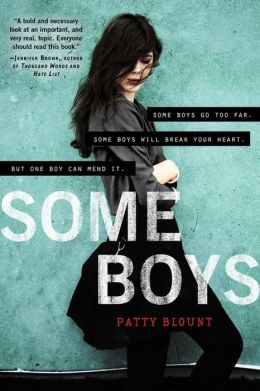Among the deepest pain I’ve ever felt in my life is being
unfairly judged and punished for something I never did by someone I trusted,
someone who should have known me better. It hurt so much, I wasn’t sure I’d
survive. I kept asking myself how anyone who knew me could think me capable of
this.
Thankfully, the internet did not factor into this particular
trial. Imagining that sort of condemnation by hundreds of people who do not
know me is a form of torture, I’m certain of it.
This is precisely how main character Grace suffers in Some Boys. After she’s attacked by sports
celebrity Zac McMahon at a party, her friends, most of the school, and her
parents don’t fully believe her side of the story. Worse, complete strangers
enter the debate online, after her attacker posts an incriminating video.
As I write this post, the internet has been lit up with news
of the tragedy that occurred when race car driver Tony Stewart hit and killed
another driver, who’d left his wrecked car. Internet users forget that they’re
posting about people with feelings, people who may be experiencing guilt we
can’t even imagine. They forget that they do not have all the facts in hand and
are rushing to judge—to pile more guilt on top of what people are already
trying to cope with because it’s just so easy to step onto that virtual soap
box.
Also as I write this post, news of comedian Robin Williams’s
death has just reached me. In my favorite role as John Keating in Dead Poets Society, Williams said, “No matter what anybody tells you, words and
ideas can change the world.”
Some Boys is sadly
a story inspired by too many real news events. If my words and ideas can change
the world, I fervently hope they will help encourage readers of this book to
practice internet restraint the next time something happens in real life that
compels them to take sides, to unfairly criticize or condemn someone simply
because everyone else is doing it, or to shame them for something that was not
their fault.
***
When Grace meets Ian, she’s afraid. Afraid he’ll reject her
like the rest of the school, like her own family. After she accuses Zac, the
town golden boy, of rape, everyone turns against her. Ian wouldn't be the first
to call her a slut and a liar.
Except Ian doesn’t reject her. He’s the one person who looks
past the taunts and the names and the tough-girl act to see the real Grace.
He’s the one who gives her the courage to fight back.
He’s also Zac’s best friend.

Patty Blount works as a software technical writer by day and novelist by night. Dared by her 13-year-old son to try fiction, Patty wrote her first manuscript in an ice rink. A short version of her debut novel, Send, finished in the top ten of the Writer's Digest 79th Annual Writing Competition.



No comments:
Post a Comment